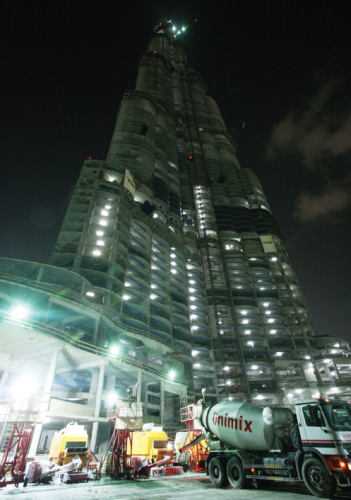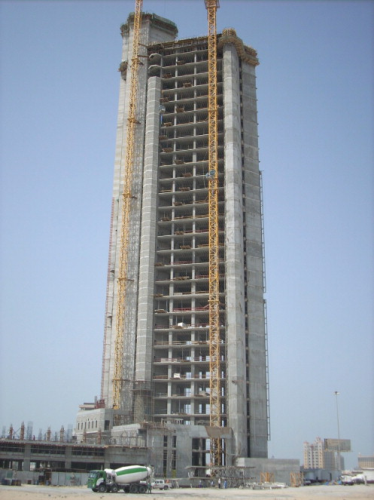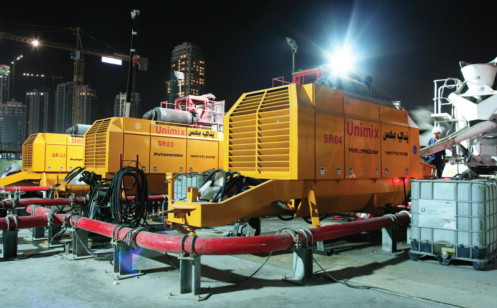


A pdf version of this article is available on the right-hand side under 'Downloads''
Back in November 2007 a new world record height of 601 m for pumping concrete was set by a Putzmeister 14000 SHP D super high pressure concrete pump being operated by Unimix on the Burj Dubai Tower in Dubai. However, this record was not to stand for very long, as it was broken in April 2008 when the same company using the same pump achieved a height of 606 m.
It was not that long ago that the construction of high rise-buildings involved concrete being lifted up in buckets by cranes. It may not have been the most efficient of processes, but it was expedient and successful. However, the world is now moving into a whole new era of high-rise construction, with the 160-floor Burj Dubai Tower at a height of 700 m setting a new benchmark (Figure 1). This revolution has had a positive impact on manufacturers of concrete pumps, who have responded by pushing forward the barriers of their technology.
Throughout the Middle East and Gulf States the investment in new high-rise properties would appear to be limitless. In Saudi Arabia alone, it has been reported that the number of planned high-rise projects in the kingdom had risen to 22 in the first quarter of 2008. With a clear vested interest in such projects, Saudi Readymix Concrete is working on the development of special hi-strength high-rise concrete mixes and is utilising advanced pumping techniques to achieve heights previously unheard of in the Kingdom.
“Some of our current projects contain as many as 20 or 30 towers, and we expect the number and size of such projects to increase over the next few years,” comments Fadi Mujahed, Saudi Readymix marketing and business development director (Figure 2). Taking note of the success that Unimix has enjoyed working with Putzmeister on the Burj Dubai Tower, Saudi Readymix has recently invested in four new stationery BSA 14000 HP D concrete pumps from Putzmeister.
Such is its interest in concrete pumping, Saudi Readymix has established a special concrete pumping division, which earlier this year organised several seminars focusing on the specific issues related to the subject with papers being presented by German pump manufacturers Schwing and Putzmeister.
Pumping concrete
According to Putzmeister Concrete Pumps GmbH, it is necessary to distinguish between the operating state of the pump (start-up, pumping, normal conveying operation, emptying and cleaning the line, malfunctions etc) and the operating state of the concrete. The type of concrete pump, either piston or peristaltic (squeezed tube) and the type of valves used for the piston pump (trunk or ‘S’ pipe) do not have any influence on the quality or the character of fresh concrete inside the pump.
Concrete can only be pushed through the delivery line when it has previously been sucked from a hopper, this being achieved by increasing the volume of the conveying space, ie the volume of delivery cylinders, of the pump so the concrete fills the conveying space to its optimum level. By decreasing the volume of the conveying space, the concrete is pushed out into the delivery line and displaces the entire concrete column in the delivery line.
On closer examination, it can be seen that the suction action is also pushing, thereby increasing the volume in the conveying space which results in a pressure level lower than the atmospheric pressure. This pushes the concrete out of the hopper into the conveying space at maximum pressure of 1 bar, but only in the absence of a continuous ‘air bridge’ between the conveying space and the atmosphere.
The low pressure level for suction and filling requires the lowest possible level of resistance to flow and deformation of the concrete. The agitator in the hopper and its geometrical shape contribute considerably towards this. The agitator not only keeps the concrete free-flowing during breaks in the conveying action but also moves and pushes the concrete during suction in an even and controlled flow rate into the suction opening. The filling rate of the conveying space is essential to the efficiency of the pump.
For optimum suction conductions, the suction openings and the conveying area diameter need to be kept as constant and as large as possible. This also results in the essential differences between piston and peristaltic pumps. Piston pumps suck in the concrete through large cross-sections and reduce the cross-section when pushing out the concrete, with the size of the output being dependent on the cylinder volume, number of piston strokes per minute and the engine power. Peristaltic pumps are limited to around 30 bar with regard to their delivery pressure and delivery performance is restricted by suction performance.
When the concrete is pressed out of the delivery cylinders of a piston pump into the delivery line, it experiences a reduction in cross-section to the diameter of the delivery line during and after passing through the valve. This results in an increase in speed together with a corresponding increase in the boundary layer per volume of unit. To reduce the associated conveying resistance, the cross-section reduction is carried out continuously as far as possible over a sufficiently long section. This reduction of the cross-section inside or immediately downstream of the pump also provides a pumpability test for the concrete.
Increasing the cross section of the line has a direct influence on the flow rate, the wear behaviour, the pressure requirement and the period for which the concrete remains in the pipeline – given the same output per hour. In comparison with the 125 mm delivery line, the cross section for the 150 mm diameter increases by around 44%. This results in a pressure reduction of around 25%, and the wear also reduces accordingly.
However, as the flow rate drops, the period for which the concrete remains in the line increases. This longer flow time must be taken into account when developing the concreting concept. With an assumed structure height of 580 m, the period for which the concrete remains in the 150 mm delivery line is around 35 minutes and added to that is the significantly higher load on the shut-off valve due to the much heavier concrete columns in the line.
It is very important for piston pumps that the delivery space is emptied as thoroughly as possible with every pump stroke. This is because as a dead volume it can remain in the delivery space, primarily on the delivery piston, at least until the next time the pump is cleaned. If this dead volume hardens or sets, there is the strong possibility that this can lead to destruction of the seals, the delivery piston and the delivery cylinder inside the wall.
Design for Burj Dubai
A proper amount of trust in the know-how and reliability of the partner was required when Unimix – responsible for concrete production and delivery at the Burj Dubai – decided to commission Putzmeister AG with the supply and installation of the pumps and boom systems (Figure 3).
For the Burj Dubai project, Putzmeister took the step of developing a particular super-high-pressure concrete pump, the model BSA 14000 SHP-D which was designed for the anticipated extreme delivery pressure. Previously Putzmeister had ascertained by pumping tests that the concrete pumps and pipelines were suitable for delivery heights up to 570 m with a pump output around 30 m3/h.
The BSA 14000 SHP-D super high pressure pumps were developed in the Putzmeister Aichtal Works with the frame and hopper having been reinforced to be able to withstand the enormous forces. The S transfer tube and S transfer tube bearings were also adjusted in respect of the expected pressures. To avoid contamination of the hydraulic fluid with water or dirt particles from the outset, the BSA 14000 SHP-D also has a particularly effective filter system. Significantly, Putzmeister engineers modified the drive hydraulics so that the translation ratio between the hydraulic and the concrete pressure would be less than i=1 with piston side operation. Due to this hydraulic ratio concrete pressures of over 400 bar (max/theory) would be possible with the high-rise pumps. Because of the expected demands for the Burj Dubai project the conveying pressure of the pump system was limited.
On site Unimix combined two of these super high pressure BSA 14000 SHP-D pumps and the ‘normal’ BSA 14000 HP-D high pressure concrete pump from the test phase to form one pump station. The machines were located around 70 m from the centre of the building tower. The super high pressure pumps were driven by a standard, 470 kW Caterpillar diesel engine, which is also integrated in other BSA concrete pumps.
Developing efficient concrete pumping for the spectacular delivery height at the Burj Dubai was just one of the many tasks for Putzmeister engineers. A particular challenge was the delivery line system, its wear behaviour and its compressive strength, as well as the line routing and mounting in the structure. Putzmeister applied for several patents in connection with this.
High strength concretes
At the request of the site management, pump lines with 150 mm (6 in) internal diameter, which are fitted over nearly the entire delivery height, were selected for pumping the particularly high strength concretes. Only in the uppermost 10 storeys were the normal Putzmeister ZX delivery lines (DN 125) installed due to easier handling. In this arrangement they could be operated with pressures up to 130 bar.
During the last pump operations, a concrete pressure of 200 bar was measured on the Putzmeister 14000 SHP D trailer concrete pump with S transfer tube with an output of 28 m3/h. During their 32 months of operation the three Putzmeister high-performance units pumped approximately 165,000 m3 of high-strength concrete. This exclusively involves concretes of the property classes C50 for the floors as well as C60 and C80 for the walls of the central core.
With a 606 m height difference, the concrete required approximately 40 minutes from the filling of the hopper to its discharge from the delivery line. The concrete volume in the line (nominal diameter 150 up to 550 m height, after this ND 125) amounted to approximately 11 m3 with this installation height. This equates to a weight of over 26 tonnes on the Putzmeister concrete pump after every piston stroke when the S transfer tube is switched. This extreme pump height was possible as a result of the cooperation between the Samsung-led team, the machine operator Unimix, the local Putzmeister agent German Gulf Enterprises, as well as the Putzmeister parent company in Germany.






